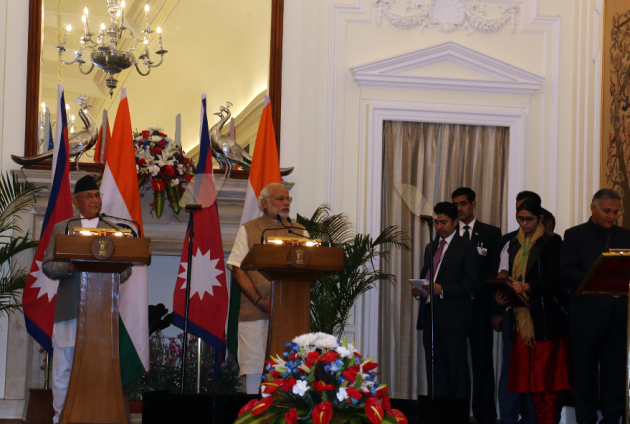Misunderstandings cleared, but scars will and should remain (Commentary)
 By Manoj Karki /Kathmandu: In a déjà vu of 1990, the newly popularly elected Prime Minister of Nepal, who made his maiden foreign visit to India after a blockade, was accorded a state-level honour by the southern neighbour.
By Manoj Karki /Kathmandu: In a déjà vu of 1990, the newly popularly elected Prime Minister of Nepal, who made his maiden foreign visit to India after a blockade, was accorded a state-level honour by the southern neighbour.
Prime Minister KP Sharma became the second Prime Minister after Krishna Prasad Bhattarai to go to India on a state visit. However, though KP Bhattarai had come to lead an interim government after the absolute monarchy was limited to a constitutional role at the heels of a movement spurred by economic sanctions imposed by India, KP Sharma Oli managed to cling to power despite an almost four-months long blockade by India at all major transit points leading to the landlocked country.
The reasons though look different, were in fact the same i.e. an effort by a tiny landlocked country to rise on its own feet. Though Nepal became a democratic state following the popular movement of 1990 held at the back of the economic sanctions imposed by the then Rajiv Gandhi-led government on the Kingdom of Nepal, it actually quashed all ongoing efforts of the country to diversify its trade and made it increasingly dependent on the southern neighbour. Such severe became the dependence on India that Nepal started to even import rice from India, which it was exporting to the same country in the 80s.
And it seems the visit by Prime Minister Oli to India will encourage Nepal’s dependency on India, now that we will be increasingly importing hydropower as well from that country. Experts say that the only way Nepal could bring down its towering trade deficit with neighbouring India is through the export of hydropower by realizing its abundant potential for the same. However, that seems a distant dream as Nepal has failed to accelerate the production of power from its rivers and anything that it will produce will be lost in only meeting its own internal requirements.
And with Prime Minister Oli pledging to rid the country of power outage within a year, more power imports from India is more than likely.
Prime Minister Oli had in fact raised some hopes of Nepal starting to stand up on its own, when he extended a hand towards our northern neighbour China. There were talks of signing a bilateral fuel agreement, opening up more transit points and benefiting from the economic progress made by the northern neighbour. As he also leads a communist party, there were many who actually trusted him of doing so, taking the country out of the India-dependency syndrome.
But the scenario today is entirely different. Forget ambitions of even becoming friendlier towards China, Prime Minister Oli has already spent six good and productive days in India. He will be returning home later this evening after a six-day state visit of the southern neighbour, where he was pampered with a rapturous welcome both in New Delhi and the Indian PM’s former state of Gujrat. The Indian President played host to him at his residence at Rashtrapati Bhawan.
Prime Minister Oli also announced at a press briefing in New Delhi that the misunderstandings were cleared and that the Nepal-India relations were back to ‘business as usual’. But what about the losses that Nepal and Nepalis suffered in those almost five painful months, and why? The losses that Nepal suffered as a result of the blockade were more severe than that of the April 25 earthquake. More Nepalis were pushed below the line of poverty, and most of it all, many Nepalis’ heart and minds were hurt due to the unkind conduct of their southern neighbour.
And even more so because the most contentious issue that actually led to protests in the southern plains of the country, and subsequent border blockade by India is yet to be addressed. The Madhesh-based parties are still warning of resuming the obstructions at the border points, if the issues relating to the delineation of federal units were not dealt with seriously.
This painful incident should have given us a lesson to learn for the future, and also because it’s a second time coming, and then there is no guarantee that we will not be facing a similar situation in the future. Unlike in 1988-89, the scar of the 2014-15 economic sanctions imposed on us by our neighbour was deeper and would take a long time to heal, and should also be there to stay for long to remind us of the need to become self-dependent, and not to rely heavily on only one of our two neighbours. One of the noblest advices to richness by Warren Buffet is to have more than one source of income, and going by it, our only way to prosperity is to have more than one reliable source of trade and business, have more than one helping hand at times of need. RSS
